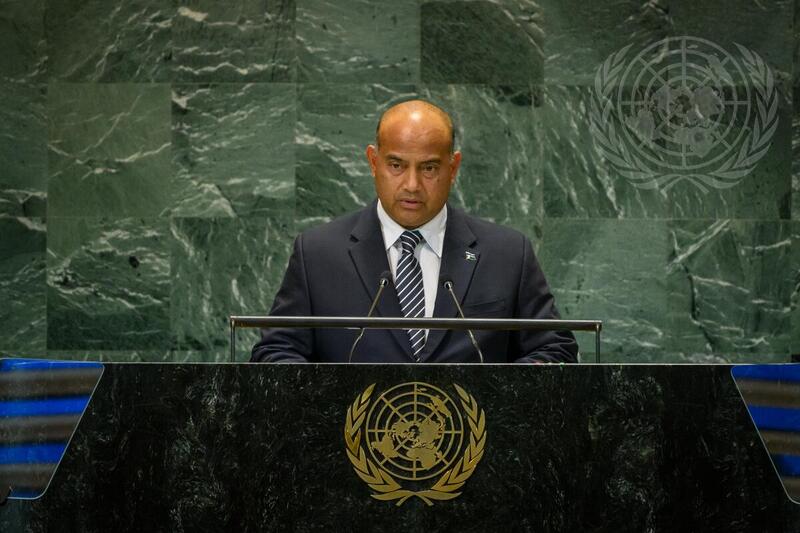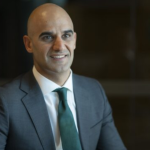Nauru’s President, David Adeang delivered a powerful call for global action at the 79th session of the United Nations General Assembly on Tuesday, highlighting the pressing challenges faced by his small island nation.
He called for greater international cooperation on climate change, ocean resource management, and UN reform, while also addressing the global financial system’s impact on small developing nations.
As a leader of a country surrounded by the ocean, Adeang highlighted the need for responsible stewardship of marine resources.
He advocated for the sustainable development of deep-sea mineral resources, stating that it is an environmental and economic imperative.
“We have been at the forefront of international efforts to protect and sustainably use the ocean’s resources, including developing and adopting the BBNJ Agreement and exploring the wealth of the deep seabed’s mineral resources in line with our objectives under the 2050 Blue Pacific Strategy.
“The greatest risk we face is not the potential environmental impacts of mineral recovery, but the risk of inaction.
“We must use the knowledge we have gathered to ensure that deep-sea mineral recovery does not compromise the integrity of our marine environment,” he said.
Adeang called on the International Seabed Authority (ISA) to adopt robust regulations to manage marine resources, emphasising the potential of deep-sea mining to transform the global transition to renewable energy.
“We have the science, the technology, and the imperative.
“To those who seek to block our efforts in sourcing renewable energy resources, do not dismiss the potential of deep-sea minerals outright. Do not ignore the science and the progress we have made. Instead, work with us to establish the robust regulations necessary for responsible mining,” he stressed.
Adeang painted a picture of resilience, but also outlined Nauru’s ongoing financial struggles, particularly in accessing climate finance and basic banking services.
“We must also address the critical issue of access to basic financial services. For nations like Nauru, equitable access to banking is not merely a convenience—it’s a lifeline. Yet, we face the growing threat of de-risking and the loss of correspondent banking relationships.
“This challenge transcends financial concerns; it strikes at the heart of our sovereignty and dignity. Our nation’s struggles cannot be measured by income alone. We are vulnerable in myriad ways, and the global financial system must evolve to reflect this complex reality,” he emphasised.
Adeang also praised the adoption of the Multidimensional Vulnerability Index (MVI), which assesses a country’s vulnerability beyond income, and urged global financial institutions to integrate it into their frameworks.
“We are encouraged by the recent adoption of the multidimensional vulnerability index (MVI) and we further call upon the World Bank, IMF, IFI and MDBs to integrate the MVI, into their frameworks. It is not just another statistic. It is a tool that provides a more accurate picture of our national circumstances—our strengths, our challenges, our potential,” he said.
Nauru’s leader highlighted the island’s improved diplomatic relations with China, praising their agreement with Japan on the release of Fukushima’s nuclear-contaminated water.
“Nauru is proud of our strong and growing friendship with China and we further commend their recent agreement with Japan on the ocean discharge of Fukushima nuclear-contaminated water.
He called the accord “a significant step toward addressing a pressing issue of global concern.”
Adeang also reiterated Nauru’s commitment to combating climate change and urged developed countries to meet their obligations under the Paris Agreement.
“To the developed nations, we say: recognise your historical responsibility for emissions and honour your obligations.
“Provide the climate finance and technology transfer you have promised. Support our efforts to transition to renewable energy, to enhance our climate resilience, and to protect our biodiversity,” he said.
He backed calls for a Fossil Fuel Non-Proliferation Treaty and the creation of a UN Special Representative on Climate and Security.
“In our pursuit against climate change, we continue to call on the UNSG to appoint a Special Representative on Climate and Security. We are pleased to endorse the call for a Fossil Fuel Non-Proliferation Treaty, and we urge countries to back this initiative for a sustainable and equitable future.
“We also eagerly await the Advisory Opinion of the International Court of Justice on Climate Change and will closely follow and support the implementation of the Court’s guidance in the pursuit of climate justice,” he said.
Adeang also expressed disappointment with the removal of Action 21 from the Pact for the Future, calling it “non-negotiable” given its focus on addressing security threats posed by climate change.
“Nauru is pleased to welcome the Pact of the Future’s ambition yet we are disappointed in the removal of Action 21. My delegation, alongside members from the Group of Friends on Climate and Security, advocated for its inclusion to address the security threats posed by the climate crises.
“Removal of Action 21 was a non-negotiable issue. Despite our flexibility to compromise, it is vital to stress the gravity of our decision,” he told World leaders.
Adeang didn’t shy away from addressing geopolitical tensions and conflicts, calling for an immediate end to the embargo on Cuba and stressing the need for peaceful resolutions to global disputes.
“As a staunch friend, we continue to call for an immediate and unconditional end to the decades-long embargo imposed on Cuba.As we know, conflicts and tensions persist across many regions of the world. In our shared pursuit of progress and prosperity, it is crucial to acknowledge that conflict impedes growth and undermines community stability,” he said.
He called for a reform of the UN Security Council to reflect 21st-century geopolitical realities.
“The current structure of the UN Security Council has been a subject of debate, with legitimate concerns about representation and effectiveness.
“We must be the leaders who bring about a new era of peace and reconciliation,” he said.
Adeang also urged the international community to act with urgency on climate, peace, and financial reform.
“To our fellow developing nations, we extend our hand in solidarity. Let us share knowledge, resources, and solutions. Let us amplify our collective voice, for in unity, there is strength.
“Leaving no one behind is not a mere platitude; it is a moral imperative
“Nauru may be small in size, but our resolve is immense,” he said.














